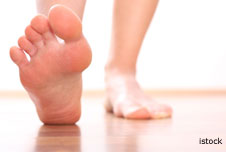| Helen: | Hello and welcome to The English We Speak. Rosie and I are doing a salsa class tonight. It's my favourite Latin American dance and I love the music! |
| Rosie: | Yes, and it's not easy ... One, two, three! Oh, I'm not very good yet—I'm still finding my feet. |
| Helen: | You're still finding your feet? No wonder you're so bad. How can you dance if you don't know where your feet are? |
| Rosie: | I do know where my feet are, Helen. When you say you're finding your feet in English, it means you're becoming confident at something. |
| Helen: | So if I say I'm still finding my feet, it means I'm still getting used to a new situation ... which might not have anything to do with feet? |
| Rosie: | That's right. And when you say you've found your feet, it means you've become familiar with a situation. |
| Helen: | Let's have a look at some examples then: |
| Helen: | So finding your feet has nothing to do with your actual feet—you can use it when you start a new job or when you're doing something new. |
| Rosie: | That's right ... And I feel like I'm getting quite good at salsa now. |
| Helen: | Really? It looks like you're still finding your feet ... |
| Rosie: | I might ask someone to dance with me, Helen. That guy over there is pretty good. Hi, would you like to dance? |
| Man: | Oh, OK. |
| Rosie: | Oooooh this is fun. One, two, three ... Oops sorry! Did I step on your foot? |
| Man: | Ouch! |
| Helen: | It looks like Rosie's doing more than finding her feet—she's finding other people's feet and stepping on them too! |
